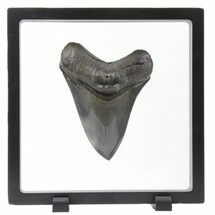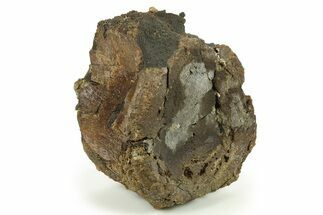1.5" Fossil Tyrannosaur (T. rex) Bone Section - Wyoming
This is a 1.5" wide section of bone from Tyrannosaurus rex, collected from the Lance (Creek) Formation of Wyoming. It's part of a T. rex skeleton that had mostly eroded away. The large cells are also indicative of a large theropod dinosaur.
True Tyrannosaurus rex material is some of the most sought after and collectable fossil material out there.
True Tyrannosaurus rex material is some of the most sought after and collectable fossil material out there.
Perhaps the most famous of all dinosaurs, Tyrannosaurus rex (abbreviated as T.rex, not T-Rex) was the largest terrestrial carnivore in North America 66 million years ago, in the Late Cretaceous period. Reaching adult sizes of 39-42 feet and 7-9 tons, this formidable predator was also one of the largest terrestrial carnivores to ever live, second only to the African Spinosaurus and possibly rivaled by the South American Giganotosaurus.
Tyrannosaurus was likely an opportunistic predator, hunting when it could and scavenging when it couldn't, using its fantastic senses of sight and smell to track potential meals. When it did need to hunt, it had a pair of powerful jaws full of 6-inch teeth that could deliver over 4 tons of pressure per square inch when they bit down. Their arms, by comparison, are infamously small.
Tyrannosaurus rex is known from an abundance of well-articulated specimens, including juveniles and subadults, so their growth patterns are well documented. It seems Tyrannosaurus grew relatively quickly, the first ten years reaching about a tenth of their adult size, then rapidly growing to their titanic adult forms in another ten. Based on growth signs in adult specimens, it would seem that Tyrannosaurs rarely lived to be more than thirty: most specimens died in their mid to late twenties. Based on pathologies of fossil bone, we can deduce that this was at least in part due to their dangerous adult lifestyle. Preying on well defended herbivores like Triceratops, Ankylosaurus, and large Hadrosaurs would have been a difficult undertaking, and healed injuries on the bones of these herbivores show that the hunts were not always successful.
Nevertheless, this great predator was one of the largest and most fearsome of the carnivorous dinosaurs, and living at the end of their age, it comes as no surprise that it be dubbed such an imposing name as "Tyrant Lizard King".
Tyrannosaurus was likely an opportunistic predator, hunting when it could and scavenging when it couldn't, using its fantastic senses of sight and smell to track potential meals. When it did need to hunt, it had a pair of powerful jaws full of 6-inch teeth that could deliver over 4 tons of pressure per square inch when they bit down. Their arms, by comparison, are infamously small.
Tyrannosaurus rex is known from an abundance of well-articulated specimens, including juveniles and subadults, so their growth patterns are well documented. It seems Tyrannosaurus grew relatively quickly, the first ten years reaching about a tenth of their adult size, then rapidly growing to their titanic adult forms in another ten. Based on growth signs in adult specimens, it would seem that Tyrannosaurs rarely lived to be more than thirty: most specimens died in their mid to late twenties. Based on pathologies of fossil bone, we can deduce that this was at least in part due to their dangerous adult lifestyle. Preying on well defended herbivores like Triceratops, Ankylosaurus, and large Hadrosaurs would have been a difficult undertaking, and healed injuries on the bones of these herbivores show that the hunts were not always successful.
Nevertheless, this great predator was one of the largest and most fearsome of the carnivorous dinosaurs, and living at the end of their age, it comes as no surprise that it be dubbed such an imposing name as "Tyrant Lizard King".
About The Lance Formation
The Lance Formation of Wyoming, which dates back to the Late Cretaceous period between 66 and 69 million years ago, is home to a wide variety of both dinosaur and assorted small vertebrate fossils. During the Cretaceous, this midwestern formation would have been comprised of streams connected to the large Western Interior Seaway that split continental North America in half down the midwest. As a result of the subtropical climate and frequent rainfall, life flourished both on land and in the sea. These wet environments created perfect scenarios for sediment deposition, making the resulting Lance Formation such a fertile fossil site.
Perhaps the most famous Lance resident would be Tyrannosaurus rex, the largest North American carnivore to ever live. However, other smaller theropods also roamed the American midwest in this subtropical coastal stream system, including the beaked Ornithomimus, a lanky running theropod with a build similar to a modern ostrich, as well as several small predatory troodonts such as Paronychodon and Pectinodon.
Herbivorous dinosaurs also took advantage of the abundance offered by this unique era. Armored ankylosaurs dwelt in herds, their safety assured by their numbers, their heavy bone plating protecting most of their bodies and even their eyelids, and huge bone clubs on the ends of their tails providing them with powerful offensive capabilities. Ceratopsians like the famous Triceratops also formed protective herds, guarding their necks with frills and horns. Their smaller relatives, the dome-headed pachycephalosaurs, were also well represented in the area. Hadrosaurs, duck-billed titans with huge batteries of plant-grinding teeth in elongated snouts, are also well known from the region.
In addition to dinosaurs, a wide variety of fishes, amphibians, lizards, snakes, turtles, champsosaurs, crocodilians, and pterosaurs have been found in the formation.
The Lance Formation of Wyoming, which dates back to the Late Cretaceous period between 66 and 69 million years ago, is home to a wide variety of both dinosaur and assorted small vertebrate fossils. During the Cretaceous, this midwestern formation would have been comprised of streams connected to the large Western Interior Seaway that split continental North America in half down the midwest. As a result of the subtropical climate and frequent rainfall, life flourished both on land and in the sea. These wet environments created perfect scenarios for sediment deposition, making the resulting Lance Formation such a fertile fossil site.
Perhaps the most famous Lance resident would be Tyrannosaurus rex, the largest North American carnivore to ever live. However, other smaller theropods also roamed the American midwest in this subtropical coastal stream system, including the beaked Ornithomimus, a lanky running theropod with a build similar to a modern ostrich, as well as several small predatory troodonts such as Paronychodon and Pectinodon.
Herbivorous dinosaurs also took advantage of the abundance offered by this unique era. Armored ankylosaurs dwelt in herds, their safety assured by their numbers, their heavy bone plating protecting most of their bodies and even their eyelids, and huge bone clubs on the ends of their tails providing them with powerful offensive capabilities. Ceratopsians like the famous Triceratops also formed protective herds, guarding their necks with frills and horns. Their smaller relatives, the dome-headed pachycephalosaurs, were also well represented in the area. Hadrosaurs, duck-billed titans with huge batteries of plant-grinding teeth in elongated snouts, are also well known from the region.
In addition to dinosaurs, a wide variety of fishes, amphibians, lizards, snakes, turtles, champsosaurs, crocodilians, and pterosaurs have been found in the formation.
SPECIES
Tyrannosaurus rex
LOCATION
Wyoming
FORMATION
Lance (Creek) Formation
SIZE
1.5 x 1.05 x .65"
CATEGORY
SUB CATEGORY
ITEM
#309910
We guarantee the authenticity of all of our specimens.
 Reviews
Reviews











